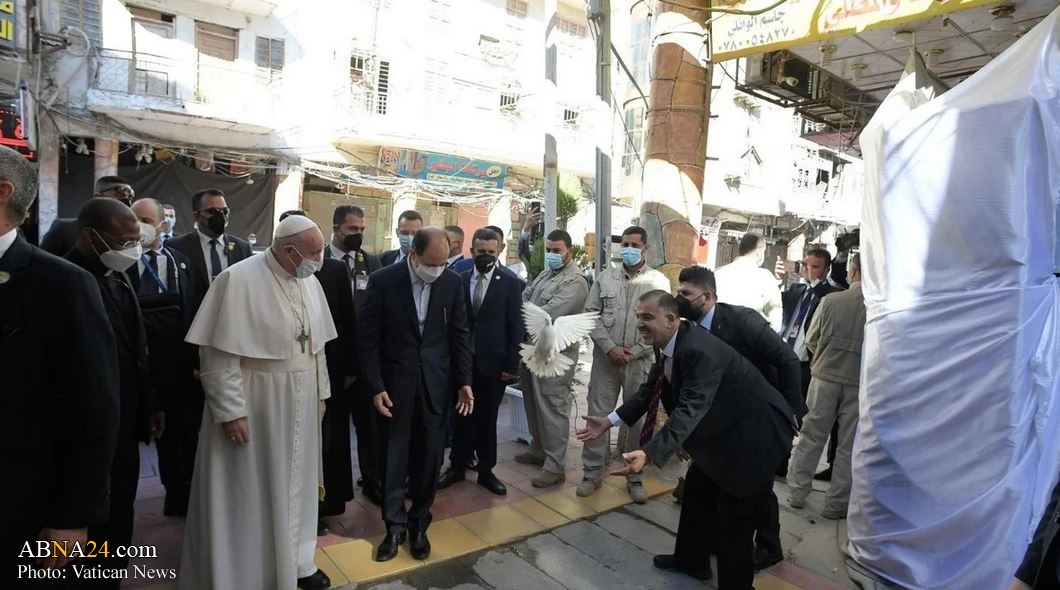AhlulBayt News Agency (ABNA): Pope’s three-day visit to Iraq has drawn considerable focus on the world media. He arrived in Baghdad on Friday in the first-ever papal visit to Iraq, receiving an official reception ceremony by the Iraqi president and prime minister.
This is the first time Pope is out of the Vatican City after 15 months of lockdown across Europe. During his stay, Francis met with Iraqi officials, and Cardinal Louis Sako, of the Iraqi Christian minority.
He also met the grand Shiite Cleric Ayatollah Sayyed Ali al-Sistani.
Although Pope Francis is considered a religious and non-political official, the visit of this Christian leader also has significant political and cultural dimensions, and this trip shows, above all, the significant position of Iraq in the trans-regional developments.
Pushing to alleviate sectarian tensions
The meeting between top religious leaders could play a significant role in reducing Iraq’s sectarian tensions that erupted after the US-British invasion of Iraq in 2003 and escalated to an unprecedented level with ISIS invading northern Iraq in 2014.
Some Iraqi analysts suggest that the risk of sectarian conflict, which killed many Iraqis in 2006 and 2007 and caused great damage to the Christian community, is one of the main drivers behind the Pope’s visit and meeting with the most influential Shiite cleric in Iraq Ayatollah al-Sistani.
Iraqi figures hold that before ISIS emergence and lightening capture of vast territories in Iraq, around 1.5 million Christians were living in Iraq, of whom only 400,000 remained now. After nearly seven years, major Iraqi cities like Mosul, as the largest concentration center of the Christian miniport in the country, remain bearing the marks of the devastation and ferocity.
The roots of Christianity in Iraq go back to the early periods of faith. The tombs of biblical figures such as Jonah and Joshua are believed to be in Iraq. The Iraqi Christian population, made up of a variety of denominations, including Armenians, Assyrians, Chaldeans, Melkites, and Syriacs, suffered vastly from a decade of devastating war caused by the US invasion of Iraq in 2003 and then the barbarous ISIS attacks from 2014 to 2017.
Pope said he waited for a long time to meet people who have suffered greatly. After ISIS invasion, many Mosul Christians were killed and many others fled the city to Erbil, the capital of the Kurdish region in northern Iraq. Erbil is now the largest concentration center of the Iraqi Christians.
Bashar Matti Warda, Archbishop of Erbil, told National Chthonic Reporter news outlet that the Pope will visit Erbil for a face-to-face meeting with the Christians there to “tell them I care about your suffering.” Earlier, Iraqi Deputy Foreign Minister Nizar al-Khairallah told Baghdad Al-Yaoum news website that “Pope’s visit to Iraq would be historic and will considerably influence the protection to the Christians".
Pope Iraq visit secure thanks to resistant groups
One of the most important aspects of the Pope's visit to Iraq is its stable security position. Iraq welcomes this visit as an opportunity to show its relative stability after years of devastating war against terrorism.
Additionally, over two years have gone since ISIS was defeated in Iraq and now the highest Christian figure is visiting Iraq with the highest degree of security as a Muslim nation.
Today Iraq owes its security to the bold role played by the resistant groups and top commanders like Iran’s General Qassem Soleimani and Iraq’s Abu Mahdi al-Muhandis whose battle against ISIS liberated Iraq from under the yoke of terrorism.
Therefore, Pope’s visit, from another viewpoint, portrays the security and stability now obvious in Iraq thanks to powerful presence of resistant groups in Iraq security provision.
Visit to Iraq of the highest Christian Church official in Iraq and a sense of security ends any doubts to any individual, group, or nation that the real security is a fruit of the Axis of Resistance, especially in Iraq and Syria where it bought security with the life of its top commanders and fighters.
/129

